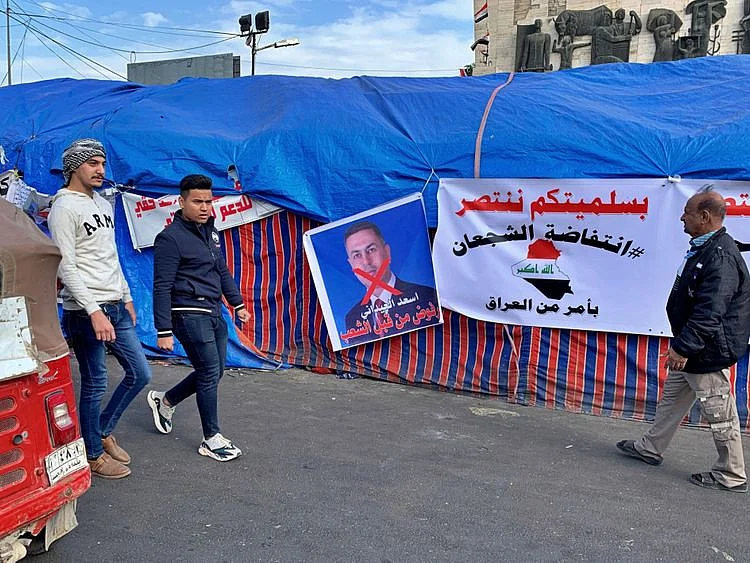Who is new Iraqi PM Asaad Al Eidani?
Analysts: He might take months to form a government if he does not step down before that

Also In This Package
Damascus: Preliminary consensus has been reached by most political parties and parliamentary blocs, to name the current governor of Basra Asaad Al Eidani as the new prime minister of Iraq.
He is expected to be asked to form a government later today by President Barham Salih, replacing the caretaker one of Adel Abdul Mehdi, toppled recently by two months of street protests, just one year after its inauguration.
Al Eidani’s name surfaced on Wednesday, after caretaker Higher Education Minister Qusay Suheil declined the job.
It was first put forth by the Iran-backed Al Binaa Alliance, which includes heavyweight Shiite leader Hadi Al Amiri and ex-Prime Minister Nouri Al Malki.
All post-Saddam premiers of Iraq have been Shiite Muslims, while speakers of the house have been Sunnis, and all presidents, with the exception of Ghazi Al Yawer, Kurds.
Al Eidani’s nomination is surprising to many observers, as he was never a candidate for the premiership before.
He was never a front-runner in the political system and seemingly affiliated with none of the big players like Moqtada Al Sadr, Falih Fayyad, or Haidar Abadi.
“It’s not final yet,” said Wathiq Al Jabery, an Iraqi analyst and adviser to the Iraqi Media Development Center in Baghdad.
“I don’t think that he will make it,” he said to Gulf News.
“There is no consensus about him yet, not even within his native Basra.”
Al Eidani’s appointment does not mean that he will succeed, added Al Jabery, and it might take weeks or even months for him to form a government, just like what happen with Abdul Mehdi, back in 2018.
The 52-year old banker-turned politician is the son of Abdul Amir Al Eidani, head of the powerful Eidan tribe.
A Basra-born electrical engineer he was trained at its university, graduating in 1993.
Al Eidani started his career in banking and finance, rising to become director of the state-affiliated Trade Bank, before landing as deputy CEO of the Al Bilad Islamic Bank.
He went undercover after joining the 1991 uprising against then-President Saddam Hussein, residing briefly in Iran.
Four years later, Saddam’s intelligence managed to track him down and have him arrested.
He remained behind-bars until 2002, a total of seven years that greatly elevated his rank in the Iraqi underground, bringing him to the attention of Ahmad Al Jalabi, head of the then-US backed Iraqi National Congress, which played a crucial role in the events that led to the 2003 invasion.
After the toppling of Saddam’s regime, Al Eidani joined the De-Baathification Committee that was charted by Paul Bremer, head of the Coalition Provisional Authority, tasked with purging the state and society from former Baathists.
He presided over de-Baathification in his native Basra, striping citizens of their jobs and salaries, throwing many into jail for being former members in the Baath Party.
Himself being a former political prisoner, he worked on documenting the crimes that took place in Saddam’s prisons.
He was active with the Iraqi National Congress, becoming its deputy secretary-general.
On August 27, 2017, Al Eidani was named governor of Basra, a year before angry protestors took to the streets of the city, attacking government property and torching the Iranian consulate.
He demanded rehaul of the entire political system that left them with no electricity, jobs, or clean drinking water for 15 long years.
Al Eidani entered negotiations with the demonstrators but failed to deliver on most of his promises, due to lack of cooperation from consecutive governments in Baghdad.
His nomination has already been rejected by the protesters of 2019, who see him as no different from Adel Abdul Mehdi.
At Tahrir Square, where young men and women have gathered since October 1, many called out his name throughout the night of Christmas on December 25, calling on him to spare them the wait and spare himself the humiliation, asking him to step down before being toppled, just like Abdul Mehdi.
Sign up for the Daily Briefing
Get the latest news and updates straight to your inbox
Network Links
GN StoreDownload our app
© Al Nisr Publishing LLC 2026. All rights reserved.